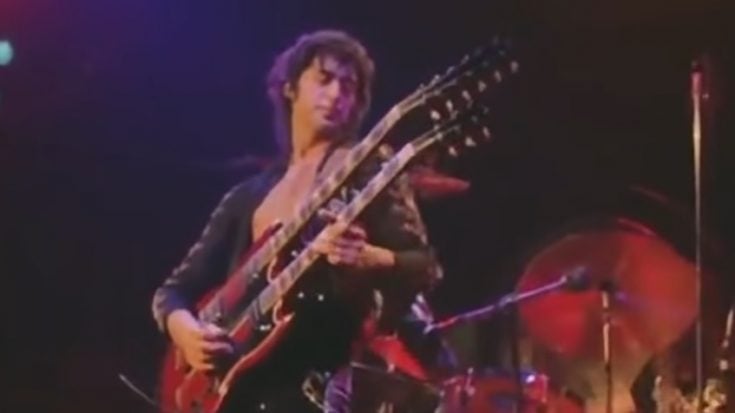3 Guitar Legends That Changed Guitar Playing For Everyone

Jimmy Page - OLD TAPES / YouTube
Guitar playing has never been a static art. Over the decades, certain players have pushed the instrument into uncharted territory, blending technical skill, creativity, and sheer audacity to redefine what was possible. Their impact didn’t just influence other musicians—it reshaped the very language of modern music, leaving behind techniques, tones, and approaches that players still build upon today.
These game-changing guitarists weren’t content to simply master the existing rules. They broke them, rewrote them, and in some cases, tore them up completely. Their playing didn’t just add to the conversation—it sparked entirely new genres, inspired waves of imitators, and set benchmarks that future musicians still chase. From the stage to the studio, their influence rippled far beyond their own recordings.
To talk about the history of the guitar without mentioning these figures would be like skipping entire chapters of a book. They didn’t just play the instrument—they transformed it. The following five legends didn’t just entertain audiences; they altered the course of guitar playing for everyone who came after them.
Les Paul
Les Paul didn’t just pioneer the guitar through his music, but also through his inventions. Particularly, Paul was one of the premier inventors of the solid-body electric guitar. His original model, simply called “The Log,” would go on to be the inspiration for one of the most famous guitars of all time, the Gibson Les Paul.
If not for Paul, it is unclear what type of electric guitars guitarists would have played at the height of rock ‘n’ roll, and what they would be playing now. Les Paul knew a need needed to be satisfied, hence, he went on to create the most groundbreaking guitar of all time.
Beyond his role as a builder and innovator, Paul was also a gifted player who brought the instrument to life in ways few could. His performances showcased the very capabilities of his own inventions, proving that design and artistry could go hand in hand. Les Paul was not just a name on a headstock—he was the reason that guitar playing, as we know it, exists.
Jimi Hendrix
You surely saw this selection coming. Though, what kind of music publication would we be if we didn’t feature arguably the greatest guitarist of all time on this list? Jimi Hendrix’s impact on the instrument is insurmountable and truly beyond words.
A better way to capture how influential Jimi Hendrix was for the guitar is to cite who he influenced: Stevie Ray Vaughan, Eric Clapton, Eddie Van Halen, Jeff Beck, Prince, Slash, and so many others. In other words, contemporary rock ‘n’ roll would sound entirely different if Jimi Hendrix had never picked up a guitar.
Hendrix’s use of feedback, wah pedals, and innovative chord voicings turned every live performance into a masterclass in sonic exploration. His fearless approach pushed the guitar beyond its perceived limits, inspiring generations to view the instrument as an endless canvas for creativity.
Joseph Kekuku
Many of you might not know who Joseph Kekuku is, but you likely won’t forget him after learning about his contributions as a guitarist and creator. In short, Kekuku is credited with perfecting and popularizing the slide guitar method, a method particularly popular in blues and country music.
This creative technique would lead not only to groundbreaking sounds in different genres but also to the creation of the steel guitar and the pedal steel guitar. Kekuku’s method would rub off on the likes of blues legends such as Sylvester Weaver and Elmore James.
His invention brought a new voice to the guitar—smooth, expressive, and haunting. Without Kekuku’s vision, some of the most soulful and emotional moments in music history might never have existed, leaving blues and country forever changed.
Jimmy Page
Jimmy Page’s influence on the guitar is impossible to overstate. As the driving creative force behind Led Zeppelin, he blended blues, folk, and hard rock into a style that inspired countless players. His riffs—such as those in “Whole Lotta Love” and “Black Dog”—became benchmarks for rock guitarists everywhere.
Page was not just a master of memorable riffs; he was also a pioneer in studio experimentation. His use of layering, alternate tunings, and innovative recording techniques gave Led Zeppelin’s music its distinctive depth and atmosphere. He proved that the guitar could be both raw and refined, heavy and delicate.
On stage, his charisma and improvisational skills made every performance unique. Whether wielding a double-neck guitar or coaxing ethereal sounds with a violin bow, Page showed the world that the guitar could be as much about spectacle as it was about sound.
Stevie Ray Vaughan
Stevie Ray Vaughan brought the blues roaring back into the mainstream during the 1980s, at a time when flashy guitar solos often dominated rock music. His fiery playing, drenched in emotion, paid homage to his influences while carving out a sound unmistakably his own.
Armed with his battered Stratocaster “Number One,” Vaughan delivered performances that were equal parts precision and raw power. His mastery of bends, vibrato, and dynamics allowed him to channel a wide range of feelings through each note, captivating audiences worldwide.
Vaughan’s legacy extends far beyond his tragically short career. He inspired a new generation of blues and rock guitarists, proving that the genre still had plenty of life left. His dedication, passion, and technical brilliance remain a touchstone for players aiming to blend skill with soul.
















